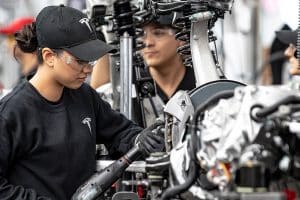Elon Musk sent a series of emails to Tesla employees and executives on Tuesday describing a termination of “work from home” policies, which brought on a wide range of reactions. Germany’s largest trade union, IG Metall, which is based in the same German state where Tesla’s Gigafactory Berlin is located, voiced a harsh reaction to Musk’s ultimatum.
Musk initially sent an email to Tesla executives that essentially stated they would need to spend their working hours at a Tesla office or they would be terminated. “Anyone who wishes to do remote work must be in the office for a minimum (and I mean *minimum*) of 40 hours per week or depart Tesla,” Musk wrote. In a follow-up email, which was sent company-wide, Musk stated that his reasoning for the change in policy, which appeared to be set aside for executives only, was because, “The more senior you are, the more visible must be your presence. That is why I lived in the factory so much — so that those on the line could see me working alongside them. If I had not done that, Tesla would long ago have gone bankrupt.”
While Musk did not explicitly state that the new rules were for every company employee, regardless of position, the CEO stated in the first line of the follow-up communication, “Everyone at Tesla is required to spend a minimum of 40 hours in the office per week. Moreover, the office must be where your actual colleagues are located, not some remote pseudo office.”
The new policy was met with a critical response from IG Metall, the German trade union that looked to establish a works council at Giga Berlin prior to its start of production.
“Whoever does not agree with such one-sided demands and wants to stand against them has the power of unions behind them in Germany, as per law,” Birgit Dietze, IG Metall’s District Leader in the State, said according to Reuters.
Tesla employs 4,000 people at the German factory, which has been operational since January 2022. The plant will expand to 12,000 workers when it reaches full production capacity. Tesla employees at the plant have already electric 19 people to run its initial workers’ council. This is a drastically different operation than Tesla’s other facilities, as Musk has always opposed unionization but has offered UAW officials to hold a vote at the company’s Fremont factory in Northern California.
Germany does not currently have any laws that would highlight work-from-home rights. However, the country’s Labor Ministry is working to increase flexibility, especially as remote work became more popular during the COVID-19 pandemic. Many employers globally are adopting the strategy as a permanent solution.
Musk believes Tesla’s disruptive products cannot be developed through telework and require face-to-face interaction with colleagues.
“There are, of course, companies that don’t require this, but when was the last time they shipped a great new product?” Musk asked. “It’s been a while.”





